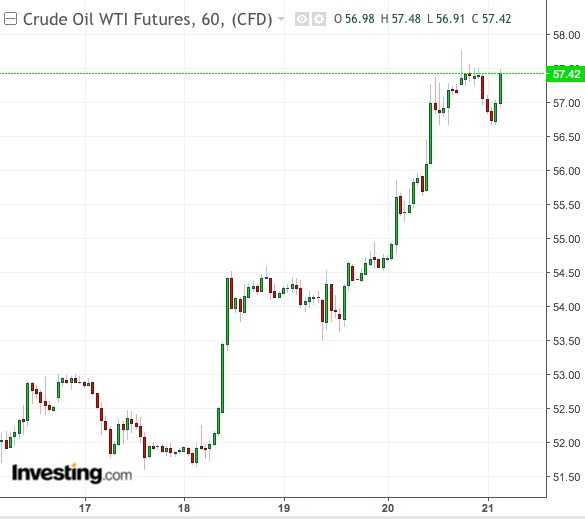To headline traders in oil, the presidential tweet coming more than 12 hours after the latest drone hit, provided the perfect opportunity to drop all caution and buy.
“Iran Made A Very Big Mistake!” U.S. President Donald Trump tweeted. Crude prices, already up 3% overnight on Tehran’s downing of a U.S. drone, immediately doubled their rally. They ended up almost 6% on the day—their biggest gain of the year.
What seemed to matter less to those long the market on Thursday was that Trump was already backtracking on his tweet, or rather clarifying it, well before trading in oil closed for the day.
Instead of blaming the Iranian state per se, as his initial response seemed to entail, the president told reporters at least an hour before the market wrapped that he thought the shooting down of the surveillance aircraft was the work of a “stupid” individual Iranian general at the Islamic Revolutionary Guard Corps, who had made a “foolish” unintentional mistake.
Of course, Trump being Trump, he didn’t stop there. The president muddied his message by adding that “this country will not stand for it … you’ll soon find out”, when asked how his administration planned to respond. He even threw in a colorful observation of little value by describing the crisis as “a new wrinkle, a new fly in the ointment.”
‘Big’ But ‘Stupid’ Mistake That Oil Bulls Chose To Ignore
But as clarifications on-the-fly go, Trump’s attempt to set the record straight was as good as it could get: Iran made a mistake—big and stupid maybe, but not intentional.
Yet, oil bulls decided to ignore the obvious in the president’s words, sending crude prices into the stratosphere after a week where the market was often unkind to them – including on Wednesday, when weekly U.S. oil data turned out to be overwhelmingly bullish and the Fed talked about the possibility of cutting interest rates. Oil bears, meanwhile, stood no chance of prevailing before the proverbial steamer—or train, truck, whatever you call it—of Thursday’s market momentum.

But by Friday noon in Asia, oil prices were down as The New York Times reported that Trump had decided not to hit back at Iran after initially approving several military strikes on the Islamic Republic following the drone attack. Despite the slide, U.S. crude remained up nearly 9% on the week—sealing its best weekly performance since April 2018. U.K. Brent oil rose nearly 4% on the week, its most since February.
There’s every chance oil could rally again next week if the next dataset on U.S. crude stockpiles/gasoline demand proves strong again.
The market could also see a sharp upside if Trump and his team hold, as he has promised, positive talks with China’s President Xi Jinping and negotiators from Beijing at the G20, to try and resolve the more-than-year-long trade war between the two superpowers that has threatened to spark a global recession.
The never-ending mantra of production cuts by OPEC oil ministers as they head for their July 1-2 meeting in Vienna and more saber-rattling on Iran are among other things that could sprinkle some magic dust on the market.
Yet, there could be one individual who may spoil the party for oil bulls.
And once again, that’s Trump himself.
Few Things Matter More To Trump Than Cheap Oil
In trying to tweak his initial response to Iran on Thursday, the president took yet one more chance to show what will truly matter to him between now and election year 2020: low oil prices. His affirmative decision not to go to war with Iran reinforces this notion.
Rallying oil markets—particularly high gasoline prices at the pump—have historically had a negative impact on incumbent U.S. presidents during election years.
Many who have followed Trump closely have not missed the care he’s taken of late not to add to the geopolitical tensions that could drive up both crude and pump prices.
This explains why despite being the architect of much of the tensions with Tehran—it was, after all, his idea to tear up Iran’s 2015 nuclear accord with the world and impose fresh sanctions on the country—he has also walked a tightrope in responding to its latest taunts.
Olivier Jakob of the PetroMatrix oil consultancy in Zug, Switzerland, says Trump has brought maximum pressure upon the Fed to lower rates and create a stimulated, feel-good economy for equities investors as well as his base of supporters.
Adds Jakob:
“It is clear that the president is now fully focused on the bid for re-election in 2020. For that, Trump wants a stronger stock-market but also no war in the Middle East. Iran understands this as well and as a result they are increasing military provocations in the hope that the U.S. lowers their demand in negotiations.”
Will The President Disrupt The Oil Rally Again?
Thursday’s drone downing comes after accusations that Tehran was also responsible for last week’s attacks on two tankers in the Gulf of Oman and last month’s sabotage of more vessels and oil infrastructure belonging to Saudi Arabia and the UAE. There have also been rocket attacks on U.S.-linked facilities in Iraq by suspected Iranian proxies. Iran also pledged this week to begin enriching uranium again, raising fears that it was seeking nuclear weapons.
It is not yet known what Trump has in his toolkit to prevent another major oil rally. His attempt last week to get Japanese Prime Minister Shinzo Abe to broker a truce between him and Iran failed spectacularly.
But this is a president whose tweets and comments in the past often have more often served to pull the market lower than to get it to rally. He could try again, and he could succeed—to the frustration of oil bulls.
